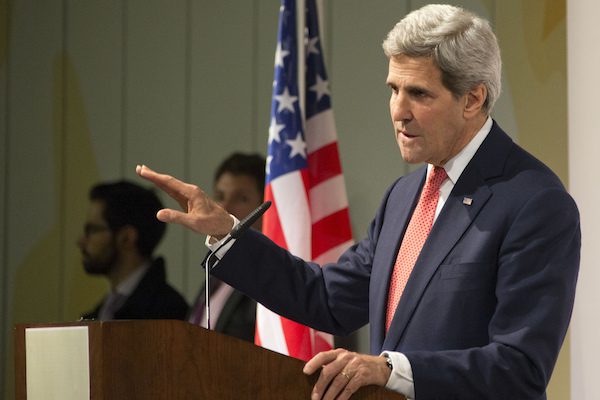The False Narrative of U.S. ‘Withdrawal from the World’

Fred Hiatt recycled a very tired argument earlier this week:
As the United States withdraws from the world, in other words, the world grows messier and uglier — and that only confirms for many Americans that any involvement is foolish and futile.
This feedback loop fuels the kind of isolationism we’ve seen this year from Donald Trump and Bernie Sanders. It helps explain why there was little talk about foreign policy, beyond chest-thumping about defeating the Islamic State, at the conventions. It will make Hillary Clinton’s job that much harder if she is elected and seeks public and congressional support for a more traditional U.S. leadership role.
Hiatt misrepresents what the U.S. is doing overseas, and he also misunderstands the foreign policy politics in this election. There is no U.S. withdrawal from the world. On the contrary, the last three years in particular have seen the U.S. become much more involved in the conflicts in several countries, and its involvement around the world has stayed the same or increased in every case.
The U.S. is in its second year of bombing ISIS in Iraq, and has been bombing targets in Syria for almost as long. The U.S. has been actively aiding the Saudi-led devastation of Yemen for over a year, and it has done so precisely because it wants to “reassure” its awful clients in the region that it isn’t going anywhere. At the same time, the U.S. has been increasing its military presence in Europe and leaving its other commitments unchanged. Earlier this summer, an exasperated John Kerry said, “The United States of America is more engaged in more places with greater impact today than at any time in American history. And that is simply documentable and undeniable.” Yet hawkish interventionists have to deny it, because it contradicts the fairy tale they’ve been peddling for years. The main problem with Kerry’s assessment is that he thinks the “impact” of all this engagement is desirable and constructive when much of it clearly is not.
The claim that the U.S. is “withdrawing” is a convenient and self-serving one for advocates of activist foreign policy, since it lets them pretend that the U.S. is following a radically different foreign policy from the one that it is actually conducting and frees them from the responsibility for the results of incessant meddling abroad. If “the world” is becoming “messier and uglier,” it isn’t happening because of a U.S. withdrawal, because the withdrawal never took place.
If one wants to understand support for Trump and Sanders, it is important to remember just how little Trump knows or cares about foreign policy and how relatively little Sanders talked about it. The so-called “isolationism” they supposedly represent reflects the candidates’ overwhelming focus on domestic problems and concerns, regardless of the quality of their solutions. They won as much support as they did because they were paying attention to the things that their voters wanted addressed, and that didn’t include demands for more global “leadership” and foreign misadventures.
For that matter, there is usually little talk of foreign policy at the party conventions. Most people don’t vote based on foreign policy, and most don’t consider it a high priority, so it normally receives short shrift. Clinton’s acceptance speech was notably light on foreign policy, but that is consistent with her entire campaign, which has done its best to use Clinton’s time as Secretary of State as proof of experience without trying to defend anything that she did while in office. Her acceptance speech last week mentioned some Obama administration initiatives, but they were all things concluded by her successor long after she left the State Department. Clinton doesn’t draw attention to her own record because there is nothing there that would impress or interest voters. The paucity of her record would also remind everyone that Obama concentrated foreign policy decision-making in the White House and gave Clinton very little to do. One of the few things that Clinton was partly responsible for in the first term–the Libyan war–is now regarded as either an embarrassing failure or a calamitous blunder, so there is nothing to boast about there.
The public would broadly prefer a less activist foreign policy, and this has been true for much of the last decade. That is a direct reaction against the disaster of the Iraq war, and it is a sane reaction to the record of incompetence, overreach, and folly that Americans have been witnessing for the last fifteen years. It is also a normal reaction when people see how the affairs of their own country seem to be neglected while the U.S. attempts to “shape” events on the other side of the planet. However, with a few exceptions, our political class works overtime to ignore that preference or vilify it as “isolationist.” It is that determined refusal to pay attention to domestic concerns coupled with the dismissal of popular discontent with repeated foreign policy failures that has fueled backlashes this year. Those backlashes will keep happening as long as the political class acts as if the answer is just to do more of the same. If Hiatt’s clueless response is any indication, that will be going on for a long time.
Comments